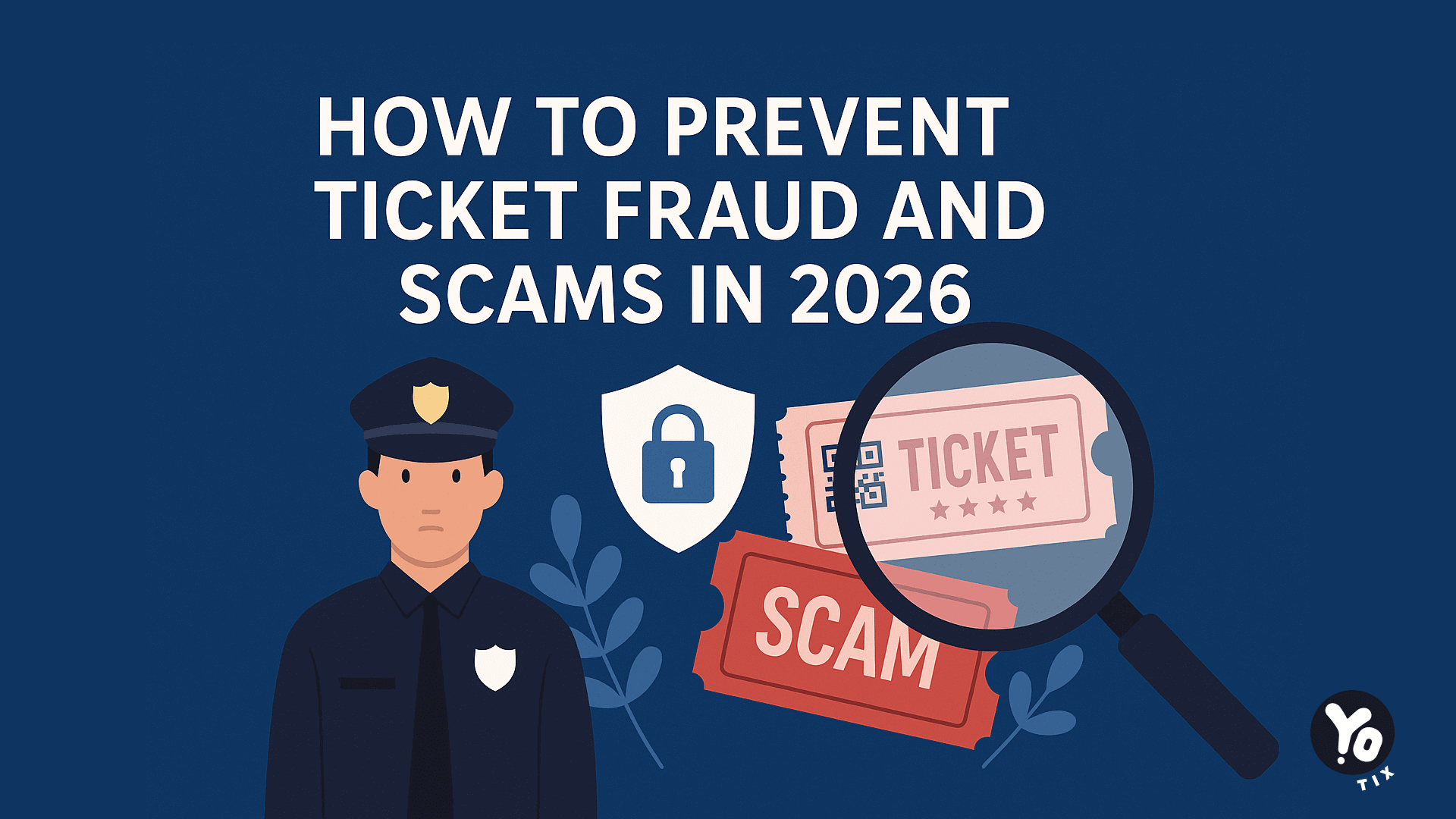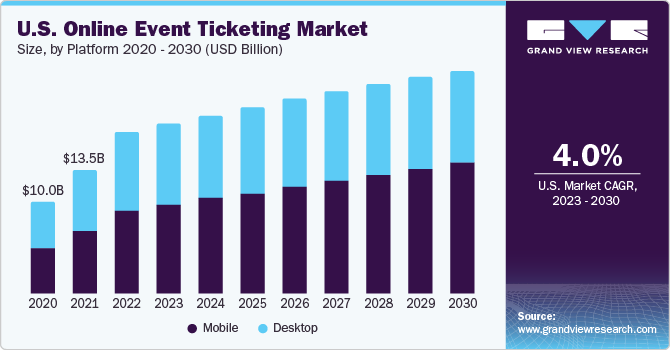How to Prevent Ticket Fraud and Scams in 2026?

The digital ticketing landscape has revolutionized how audiences attend concerts, sports events, and festivals. But with this digital convenience comes a growing threat — ticket fraud and scams.
In 2025, fraudsters will be more advanced than ever, leveraging AI, deepfake technology, and social engineering to deceive buyers and even event organizers. Preventing these scams requires more than just caution — it demands smart systems, real-time verification, and AI-driven fraud prevention.
This detailed guide explores how to prevent ticket fraud and scams in 2026, from the latest types of digital scams to advanced prevention techniques and security technologies shaping the future of ticketing.
Growing Threat of Ticket Fraud in 2025
Scale of the Problem
The global online ticketing industry is projected to reach USD 89.44 billion by 2030.

Source: (Grand View Research)
Alongside this growth came a sharp rise in scams — with cybersecurity reports showing that over 12% of online ticket transactions in 2024 were fraudulent or suspicious.
Why Does Ticket Fraud Persist?
- Ease of replication: Scammers can duplicate barcodes or QR codes in seconds.
- Lack of verification: Smaller event organizers often lack fraud detection tools.
- Anonymous transactions: Crypto and decentralized payments make tracing criminals difficult.
- High demand events: Scarcity creates urgency — making buyers more vulnerable to scams.
Common Types of Ticket Fraud in the Modern Era
Understanding the common forms of fraud is the first step in preventing them.
Counterfeit Tickets
Fraudsters generate fake or duplicated tickets and sell them online or via social media. Many victims only realize the scam when denied entry at the venue.
Fake Ticketing Websites
Cybercriminals clone authentic ticketing systems, mimicking their design, logo, and even SSL certificates to trick customers. These fake websites collect money — and sometimes personal data — without delivering any tickets.
QR Code and Barcode Duplication
One of the most prevalent scams today, QR duplication allows fraudsters to sell the same ticket multiple times using replicated codes.
Phishing and Refund Scams
Scammers send fake confirmation or refund emails asking users to “verify” payment details — leading to stolen credentials and unauthorized charges.
Social Media Reselling Scams
Fraudsters post fake tickets on Facebook Marketplace, Instagram, or Telegram groups, using urgency (“Only 2 left!”) to pressure buyers into instant payment.
Bot Scalping
Automated bots bulk-buy thousands of tickets seconds after they go live, leaving genuine fans empty-handed. The scalpers then resell these tickets at exorbitant prices.
Why Have Ticket Scams Become Smarter?
Today’s fraudsters aren’t amateurs — they’re organized cyber syndicates using advanced technology.
AI-Driven Deception
Deepfake-generated reviews, AI chatbots posing as customer support, and realistic cloned websites make it nearly impossible for untrained users to detect fakes.
Decentralized Payments
Many scams now involve crypto payments — offering anonymity to scammers and making refund recovery difficult.
Weak Verification Systems
Some event platforms still use static codes or outdated verification methods, allowing ticket replication.
Automation Tools
Sophisticated bots can mimic real human behavior, bypassing CAPTCHA and purchasing large ticket volumes instantly.
Strategies for Event Organizers to Prevent Ticket Fraud
Event organizers play a key role in ensuring safe, transparent, and fraud-free ticketing. The following strategies combine AI, blockchain, and advanced authentication methods to create a secure ecosystem.
Implement Blockchain or NFT-Based Ticketing
Blockchain-based tickets are unique, immutable, and traceable. Each ticket is recorded on a public ledger, making it impossible to counterfeit or duplicate.
Advantages:
- Transparent ownership history
- Easy verification via blockchain explorers
- Built-in resale control through smart contracts
- Tamper-proof transfer records
When Coachella introduced blockchain tickets for select events, counterfeit attempts dropped by over 90%, demonstrating the power of decentralization.
Leverage AI-Powered Fraud Detection Systems
AI algorithms can detect suspicious behavior patterns and fraudulent transactions in real time.
How AI Helps:
- Flags multiple purchases from the same IP
- Detects sudden bulk buying (indicative of bots)
- Monitors unusual transaction frequency
- Blocks accounts using compromised credit cards
Yotix, an AI-powered event ticketing platform, uses machine learning algorithms to identify and block suspicious activity automatically, protecting both event organizers and attendees.
Use Dynamic QR and Barcode Technology
Static codes can be easily copied or sold multiple times.
Dynamic QR codes, on the other hand, regenerate with time and are linked directly to verified user profiles — making replication impossible.
Secure Your Payment Gateways
Always use PCI DSS-compliant payment processors. Secure payment gateways like Stripe, Razorpay, or PayPal offer encryption and fraud monitoring tools to detect anomalies.
Enable 3D Secure (OTP verification) to ensure the payment is made by the legitimate cardholder.
Introduce Multi-Factor Authentication (MFA)
Require buyers to verify their identity using:
- Email confirmation
- Mobile OTP verification
- Face or biometric ID for VIP or high-value tickets
This ensures the ticket is linked to a verified human, reducing fake account risks.
Educate Customers
Awareness is your strongest shield against scams. Regularly post safety alerts like:
- “Buy tickets only from our official website.”
- “Avoid sharing screenshots of your tickets online.”
- “Never send payments via direct transfer or crypto.”
This not only builds customer trust but also enhances brand credibility.
Safety Tips for Ticket Buyers in 2025
As much as technology helps, personal vigilance is equally important.
A. Buy Only from Official or Verified Sources
Avoid buying tickets from social media, random links, or resale platforms without buyer protection. Always check the event’s official website or authorized partners.
Verify Website Authenticity
Before purchasing, look for:
- HTTPS (secure padlock symbol)
- Correct spelling of the domain (no typos)
- Contact details and return/refund policy
- Verified social media pages linked from the site
Be Wary of Unrealistic Discounts
Scammers often tempt buyers with too-good-to-be-true prices. Authentic ticketing sites rarely offer deep discounts near event dates.
Use Secure Payment Methods
Credit cards, PayPal, or verified digital wallets offer dispute resolution options — direct transfers don’t.
Avoid Public QR Code Sharing
Never post your ticket barcode or QR code on social media. Fraudsters can copy and sell it within minutes.
Confirm Event Details
Cross-check event dates, times, and venue details from the official event organizer’s page before making payment.
How AI is Revolutionizing Ticket Fraud Prevention?
AI is no longer a luxury — it’s a necessity in 2025’s ticketing landscape.
Real-Time Behavioral Analysis
AI models analyze millions of transactions and detect irregular purchase behavior — such as multiple accounts using one card or abnormal IP geolocation patterns.
Bot Detection
Machine learning algorithms identify and block bots in milliseconds, allowing only genuine human buyers to complete transactions.
Predictive Fraud Detection
AI assigns risk scores to each transaction. If a purchase looks suspicious (for example, high-volume purchases from a VPN IP), it’s flagged or blocked automatically.
Identity Verification
AI systems verify user documents, ensuring tickets are sold to legitimate individuals — reducing chargebacks and fake accounts.
Emerging Security Technologies for 2026 and Beyond
The ticketing industry is rapidly evolving, adopting innovative technologies to combat fraud.
Biometric Ticketing
Facial recognition or fingerprint-based entry validation ensures that only the rightful ticket owner can access the venue.
Decentralized Identity (DID) Verification
Users control their identity data through secure blockchain wallets, reducing the risk of data breaches and impersonation.
Smart Contract Ticketing
Smart contracts automatically enforce resale limits and prevent scalping.
Augmented Reality (AR) Verification
Buyers can use AR apps to scan tickets and instantly verify authenticity through holographic overlays or dynamic security stamps.
By 2027, over 65% of ticketing platforms are expected to integrate AI and blockchain as core components of fraud prevention.
Case Study: AI Prevents a Major Ticket Scam
In 2025, a major international sports event in Singapore detected a surge of fake QR code tickets being sold through Telegram.
Using an AI-driven verification system similar to Yotix, organizers flagged and canceled over 12,000 counterfeit tickets before event day — saving nearly $450,000 in potential losses.
This incident highlights how AI-driven systems can proactively protect events and audiences without disrupting the user experience.
Practical Checklist to Prevent Ticket Fraud
For Event Organizers
- Use blockchain/NFT ticketing
- Deploy AI-powered fraud detection
- Enable dynamic QR/barcodes
- Educate buyers regularly
- Partner with verified payment gateways
- Implement MFA and user ID verification
For Buyers
- Purchase only from official channels
- Avoid social media or resale listings
- Use secure payment methods
- Never share QR codes publicly
- Verify event details from official sources
Conclusion: Building a Fraud-Free Future with Yotix
Ticket fraud in 2025 is more advanced than ever — but so are the solutions. By leveraging AI-driven analytics, blockchain technology, and customer education, the event industry can create a future where every ticket is verifiable and secure.
Yotix, an AI-powered event ticketing platform, leads this transformation by offering real-time fraud detection, blockchain-backed ticketing, and secure payment integration. With Yotix, event organizers and attendees can finally experience trustworthy, transparent.
Frequently Asked Questions (FAQs)
How can I tell if my ticket is fake?
Compare your ticket details with the official event listing. Fake tickets often have mismatched fonts, missing event details, or invalid QR codes.
Is it safe to buy from social media or friends?
No, unless the resale platform is verified and provides transfer tracking. Peer-to-peer deals are risky and often untraceable.
How do AI-powered systems like Yotix prevent fraud?
AI analyzes every purchase in real time, blocks suspicious transactions, and ensures only legitimate users can access or transfer tickets.
What should I do if I get scammed?
Contact your bank immediately, file a chargeback (if applicable), and report the incident to your local cybercrime cell.
Can blockchain completely eliminate ticket fraud?
While it cannot remove every risk, blockchain ensures ticket authenticity, traceability, and secure resale — drastically reducing fraud potential.

